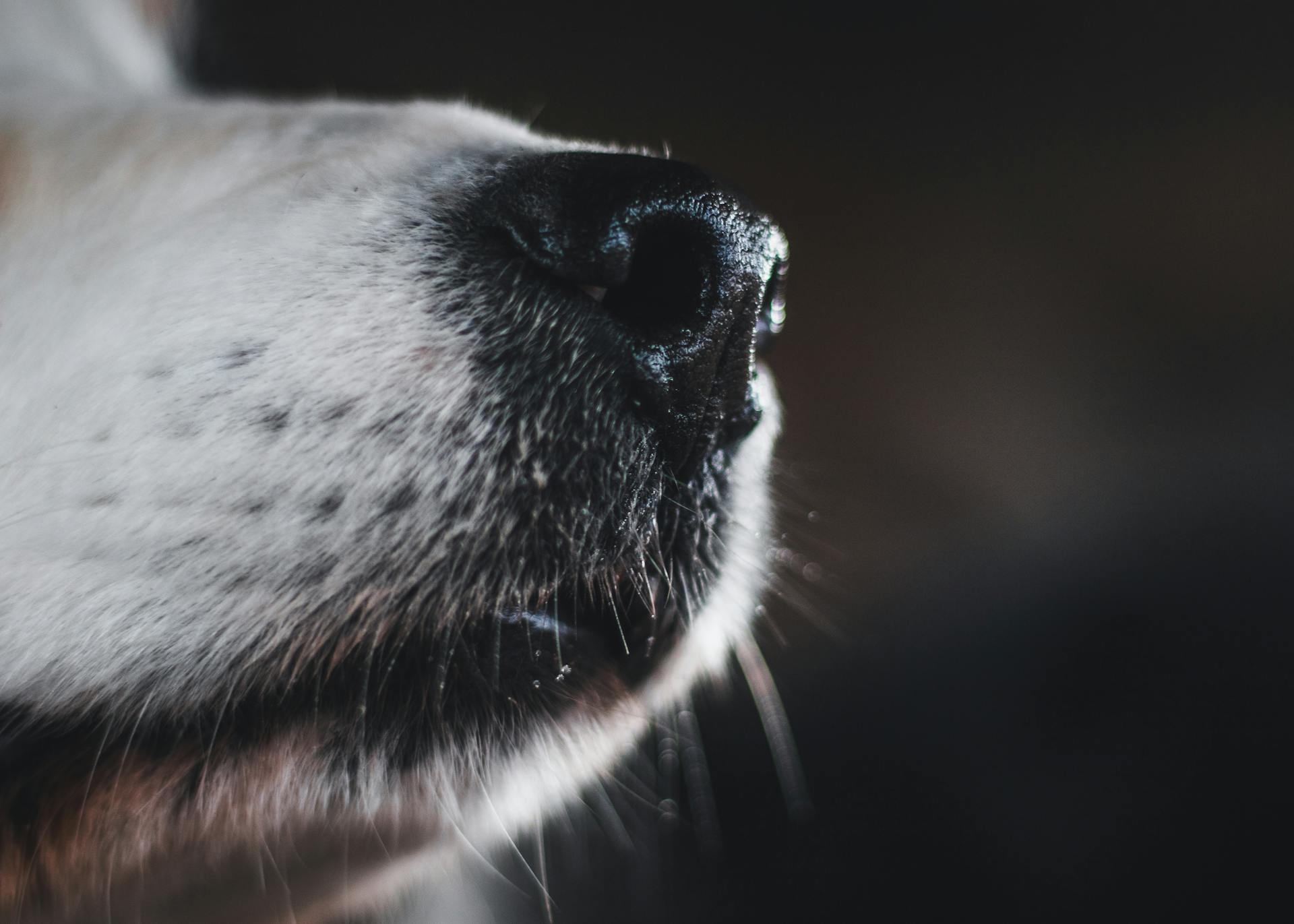
Tracheobronchitis in dogs is a common respiratory issue that can cause a range of symptoms, from mild coughing to life-threatening complications.
The condition is often caused by a viral or bacterial infection, which can be contagious to other dogs.
Coughing is the most common symptom of tracheobronchitis in dogs, and it can be dry or productive, depending on the severity of the infection.
Tracheobronchitis can be triggered by factors such as allergies, smoke exposure, and poor air quality, which can irritate the airways and make them more susceptible to infection.
Symptoms of tracheobronchitis in dogs can include wheezing, sneezing, and a runny nose, in addition to coughing.
What Is It?
Tracheobronchitis in dogs, also known as kennel cough, is a common respiratory infection.
It's caused by a viral or bacterial agent, often Bordetella bronchiseptica, which infects the trachea and bronchi.
Symptoms typically include a dry, hacking cough that can last for weeks.
The cough is often accompanied by a runny nose and sneezing.
Dogs may also exhibit lethargy, loss of appetite, and difficulty breathing.
The infection can be spread through direct contact with an infected dog's saliva, nasal discharge, or contaminated environment.
Prevention is key, and vaccinating your dog against Bordetella bronchiseptica can help reduce the risk of infection.
Causes and Risk Factors
Tracheobronchitis in dogs, also known as kennel cough, can be caused by multiple bacteria and viruses, including Bordetella bronchiseptica bacteria and Canine adenovirus.
Some of the most common viruses that contribute to kennel cough include Canine Parainfluenza (CPIV) and Canine Influenza. These viruses can weaken a dog's immune system, making them more susceptible to bacterial infections.
Dogs can contract kennel cough through exposure to the respiratory secretions of an infected dog, often through coughing or sneezing. They can also contract the infection from infected objects, such as shared toys or food and water bowls.
The following groups are at higher risk of contracting canine cough:
- Puppies
- Geriatric dogs
- Dogs with immune-mediated diseases
- Dogs on immunosuppressant drugs (such as prednisone)
- Brachycephalic dog breeds (such as Pugs and French Bulldogs)
- Dogs with pre-existing respiratory issues (such as collapsing trachea or upper respiratory constrictions)
Dogs are typically exposed to kennel cough when they are in crowded areas, such as animal shelters, boarding kennels, dog daycare facilities, grooming facilities, and dog parks.
Causes and Risk Factors
Kennel cough in dogs can be caused by multiple bacteria and viruses, including Bordetella bronchiseptica, Canine adenovirus, Parainfluenza virus, Mycoplasma, Canine influenza virus, Canine distemper virus, Canine respiratory corona virus, and Canine reovirus.
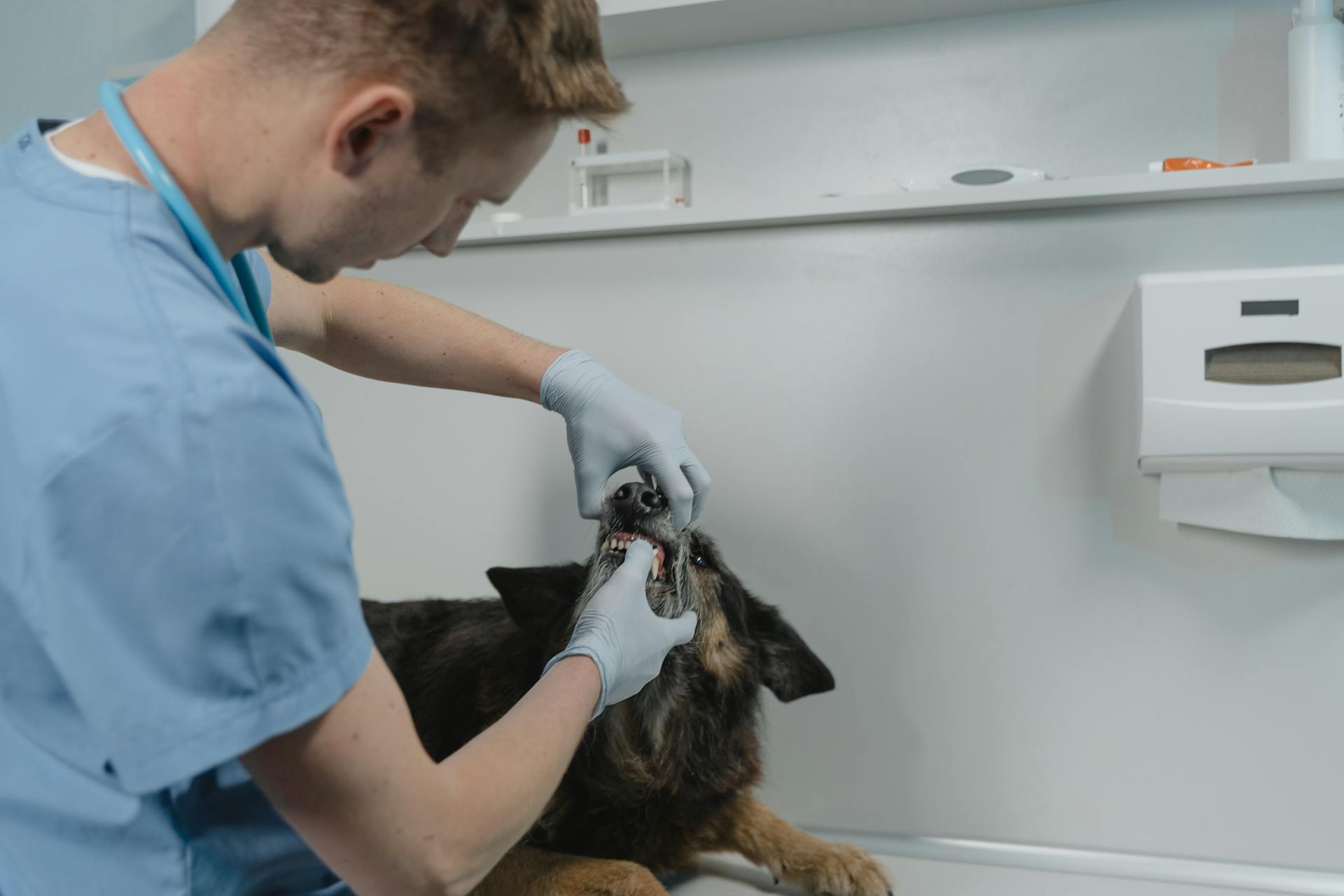
These pathogens can be spread through respiratory secretions, such as coughing or sneezing, from an infected dog to a healthy one. Dogs can also contract kennel cough from contaminated objects like shared toys, food bowls, or water bowls.
Kennel cough is often spread in crowded areas, including animal shelters, boarding kennels, dog daycare facilities, grooming facilities, and dog parks.
The most common causes of kennel cough in dogs are Bordetella bronchiseptica and Parainfluenza, according to veterinary reports.
Here are some of the bacteria and viruses that can cause kennel cough in dogs:
- Bordetella bronchiseptica bacteria
- Canine adenovirus
- Parainfluenza virus
- Mycoplasma
- Canine influenza virus
- Canine distemper virus
- Canine respiratory corona virus
- Canine reovirus
Risk Factors
Contracting kennel cough is a real concern for many dog owners. Your pet's environment plays a significant role in determining their risk of catching this contagious disease.
Staying in crowded dog spaces or facilities, such as kennels, rescue shelters, and boarding facilities, increases the chances of contracting kennel cough.
Moist, warm, and poorly ventilated environments are also breeding grounds for kennel cough. This is because the bacteria that cause the disease thrive in such conditions.
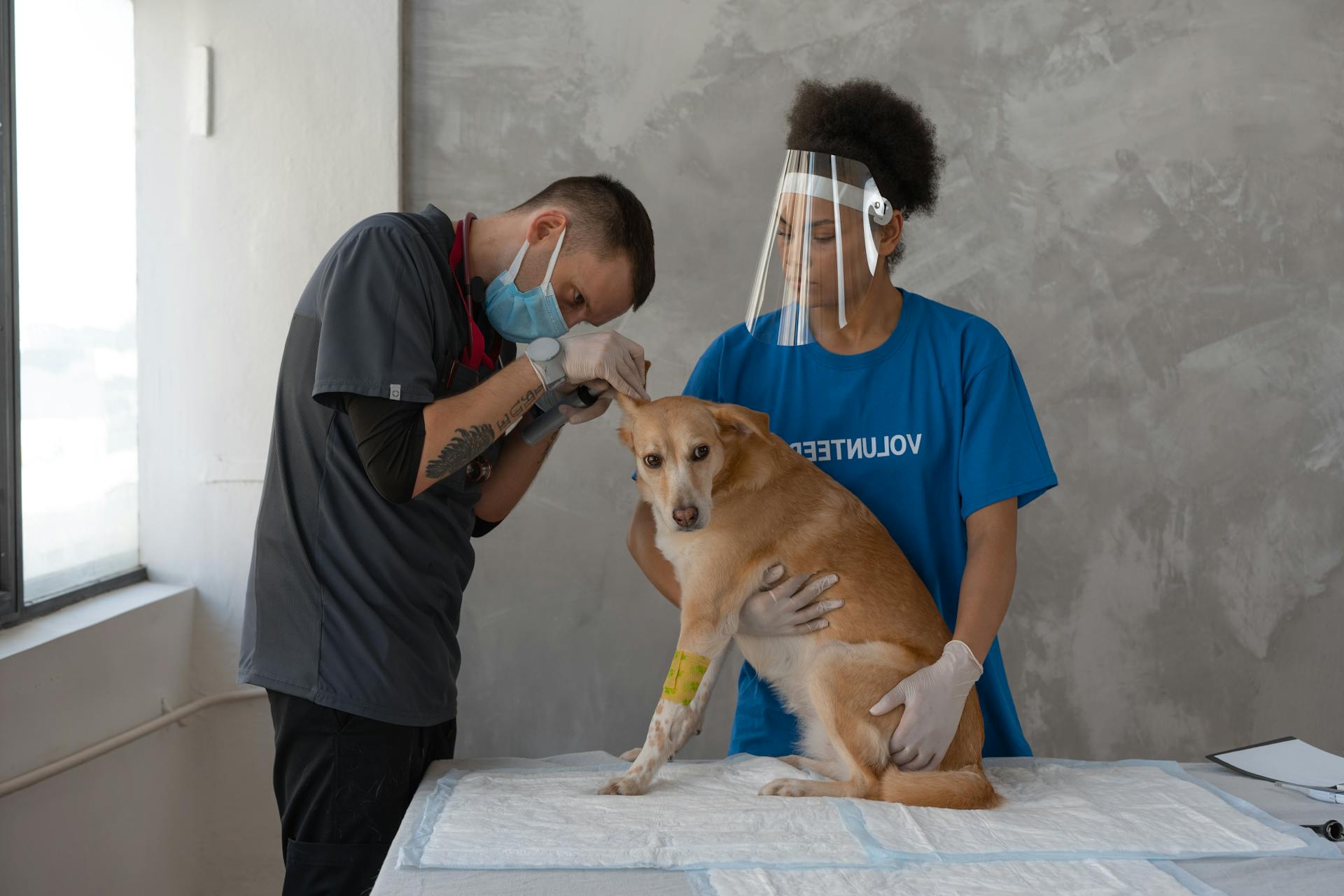
Exposure to people who come into contact with large numbers of dogs, such as veterinarians, trainers, sitters, groomers, and walkers, also puts your pet at risk.
Stress, whether due to travel or an unfamiliar environment, can weaken your pet's immune system and make them more susceptible to kennel cough.
Exposure to dust and cigarette smoke can also increase the risk of contracting kennel cough.
Here are some specific groups that are at higher risk of contracting canine cough:
- Puppies
- Geriatric dogs
- Dogs with immune-mediated diseases
- Dogs on immunosuppressant drugs (such as prednisone)
These groups are not only more likely to contract the infection, but they are also more likely to experience severe secondary complications, such as pneumonia.
Symptoms and Diagnosis
Symptoms of tracheobronchitis in dogs can vary in severity, but they often include a persistent dry, hacking cough, retching with the production of white foam, clear eye drainage, runny nose, and sneezing. A tracheal sensitivity test, where gentle pressure is applied to the trachea, can also reveal windpipe sensitivity.
If your dog is experiencing a persistent cough, it's essential to take them to the vet for a proper diagnosis. A diagnosis can be made based on the dog's symptoms, history, and response to therapy. Identifying the underlying bacteria or virus is typically not needed, but diagnostic testing is recommended for dogs where pneumonia is suspected, dogs that do not respond to supportive care, and dogs with signs of systemic disease.
Common symptoms of tracheobronchitis in dogs include:
- Persistent, dry, and hacking cough
- Sneezing
- Runny nose
- Watery eyes
- Mild fever
- Loss of appetite
- Lethargy
What to Watch For
Symptoms of kennel cough can vary in severity, but some common signs include a persistent, dry, and hacking cough, sneezing, runny nose, and watery eyes.
If your dog is experiencing a loud, honking cough that worsens with activity or excitement and can persist for minutes, it's a good idea to take a closer look.
A classic symptom is when the dog acts as if something is stuck in the throat and retches or vomits up fluid after coughing.
You might also notice signs of upper respiratory problems such as conjunctivitis, rhinitis, or sneezing.
In some cases, secondary bacterial pneumonia can develop, leading to loss of appetite, depression, or fever.
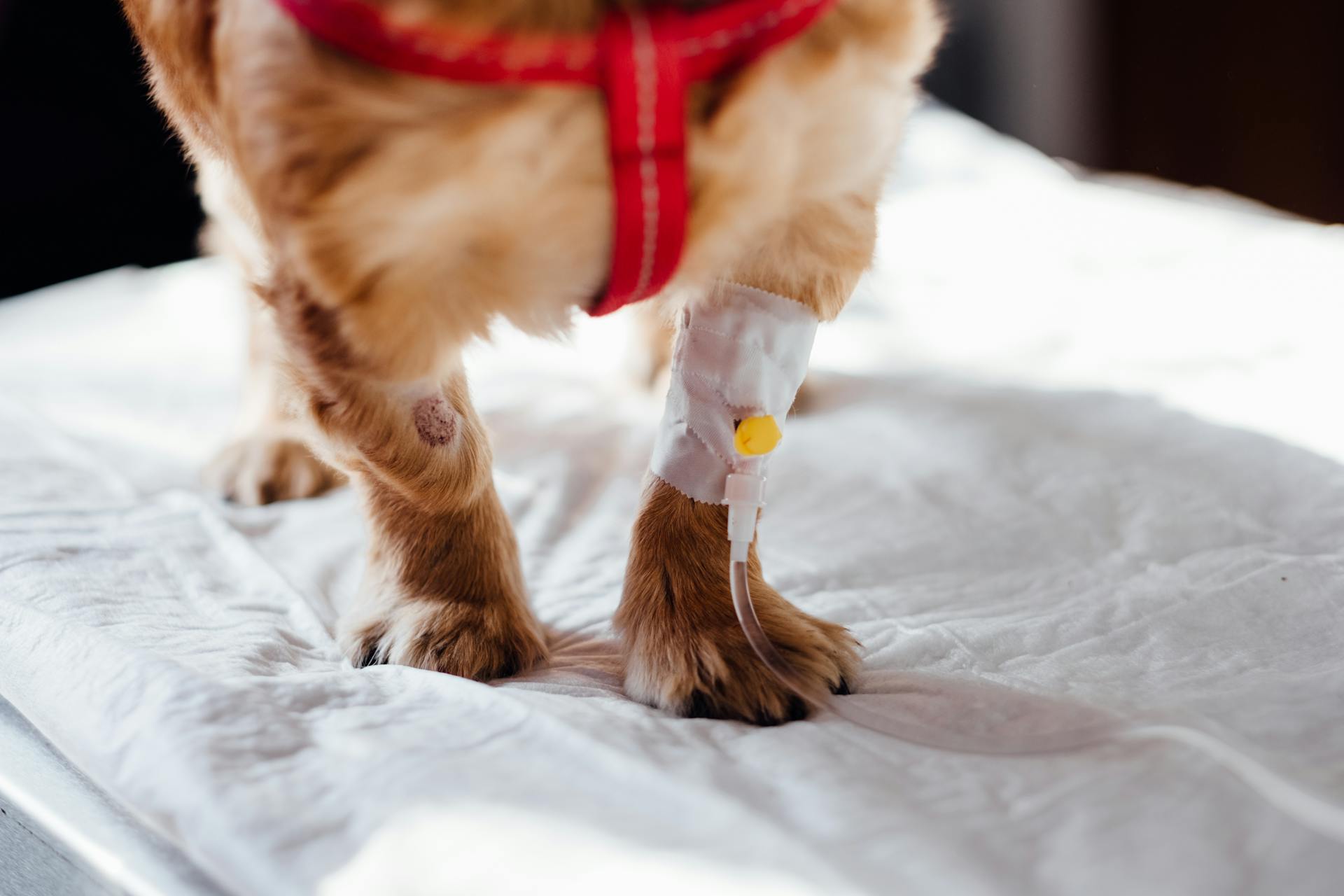
If your dog is showing any of these signs, it's a good idea to visit your veterinarian to rule out pneumonia.
Here are some key symptoms to watch for:
- Loud, honking cough that worsens with activity or excitement
- Acting as if something is stuck in the throat and retching or vomiting up fluid
- Loss of appetite
- Depression
- Fever
- Difficult breathing
How Veterinarians Diagnose
Diagnosing kennel cough in dogs can be a straightforward process, but it requires a thorough examination of the dog's symptoms and medical history. A diagnosis can be made based on the dog's symptoms, history, and response to therapy.
A veterinarian will typically start by taking a complete medical history, which may reveal recent exposure to a kennel or other dogs. This is often a key indicator of kennel cough.
Additional diagnostic tests may be needed if the condition doesn't improve within 3 to 7 days or if the dog shows signs of systemic disease. Routine laboratory blood tests, including a complete blood count (CBC) or blood chemistry panel, may be recommended if the dog is older or showing signs of generalized illness.
A chest X-ray may be requested to screen for infections or anemia. A fecal flotation should also be done to exclude intestinal parasites in all puppies unless they have been previously subjected to a regular deworming program.
Here are some common diagnostic tests used to diagnose kennel cough:
- A chest X-ray to rule out pneumonia
- Routine laboratory blood tests, including a CBC or blood chemistry panel
- A fecal flotation to exclude intestinal parasites
- A tracheoscopy and bronchoscopy if a foreign body is suspected
- A culture and cytology of bronchial fluid if there is a suspicion of a resistant bacteria or severe pneumonia
These tests can help veterinarians determine the best course of treatment and ensure that the dog receives the care it needs to recover from kennel cough.
Incubation Period
The incubation period of kennel cough is a crucial aspect to understand, as it can help you prepare for the symptoms that are to come.
It usually takes between 3 to 10 days after exposure for the clinical manifestation of canine cough to become obvious.
This means that even if your dog seems fine at first, they could start showing symptoms in just a few days.
Treatment and Care
Limit exercise and enforce periods of rest, as activity often initiates periods of loud, uncomfortable coughing in dogs with tracheobronchitis.
To maintain hydration, encourage your dog to drink plenty of fluids and provide soft food if dry food irritates the throat. Adding broth to their drinking water is a good way to promote increased water intake.
You can help mobilize secretions and reduce coughing by providing humidified air, such as with a vaporizer in your dog's room or in a steamy bathroom for one or two hours.
To alleviate coughing, you can use a nebulizer with saline water twice a day for at least 10 minutes, or try home remedies like honey (after discussing with your vet), but be sure to follow their advice.
Here are some essential tips to keep in mind:
- Remove collars and replace them with harnesses to decrease airway irritation.
- Avoid environmental stresses, including house dust, vapors, chemical fumes, and tobacco smoke.
- Monitor your dog's overall health status, breathing difficulty, and lethargy closely.
- Use a harness instead of a collar during walks, as collars with leashes can place extra pressure on the trachea.
Home Care
Home care is a crucial part of treating kennel cough in dogs. Limit exercise and enforce periods of rest, as activity can initiate periods of loud, uncomfortable coughing.
To keep your dog hydrated, encourage adequate fluid intake and provide soft food if dry food irritates the throat. If your dog normally wears a restraint collar, remove it or replace it with a harness to decrease airway irritation.
Avoid exposing your dog to environmental stresses, including house dust, vapors, chemical fumes, and tobacco smoke. Instead, provide humidified air to mobilize secretions and reduce coughing.
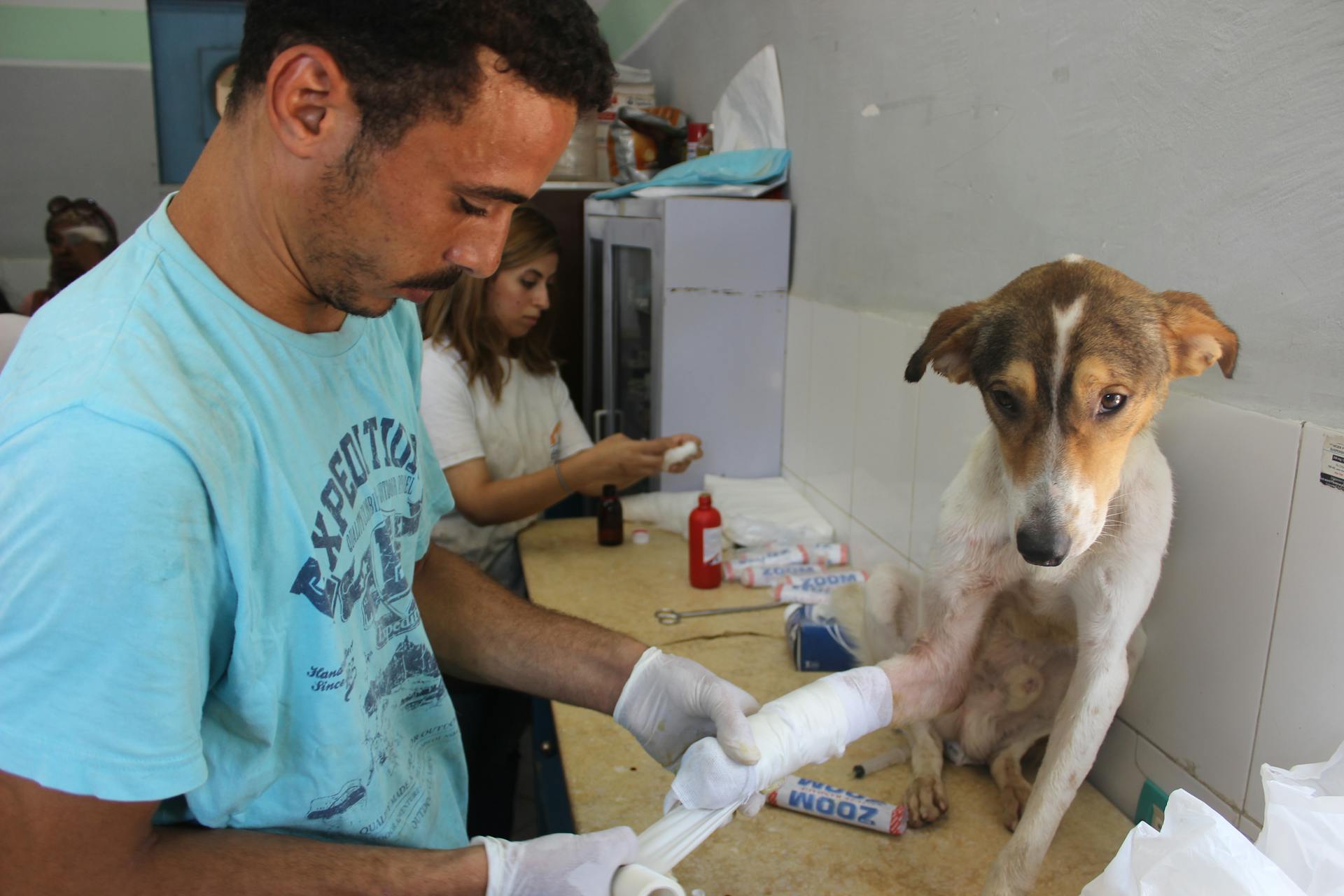
Here are some specific tips to help your dog feel more comfortable:
- Administer prescribed veterinary medication as directed
- Follow up with chest X-rays if recommended by your veterinarian
- Keep an eye out for changes in your dog's overall health status, breathing difficulty, and lethargy
By following these home care tips, you can help your dog recover from kennel cough and feel better sooner.
Vaccine
Vaccinations can provide very good protection against Infectious Tracheobronchitis (ITB) in most dogs, but protection is not 100 percent.
Some dogs will still contract ITB despite vaccination, so it's essential to follow up with regular check-ups and care.
Vaccinating your dog against kennel cough is a good idea, especially for breeds with brachycephalic faces like English Bulldogs, Pugs, Pekingese, and French Bulldogs.
These breeds are more likely to struggle with recovering from respiratory diseases due to their compromised airways.
The kennel cough vaccine is not 100% effective at preventing the disease, but it can reduce the severity of symptoms.
The vaccine is especially helpful for dogs that are exposed to other dogs, as it can reduce their chances of contracting kennel cough.
Take a look at this: Dog Breeds Watch Dogs
The vaccine is available in various forms, including an oral liquid that is very safe with little side effects and no injection required.
The injectable Protech C4 vaccine protects dogs from viruses that contribute to Kennel Cough, including Parainfluenza, while the Protech C4 + bb vaccine offers additional protection against Bordetella bronchiseptica.
Using a combination of the Protech C4 injectable vaccine and the Bronchi-shield oral vaccine can provide the best protection against Kennel Cough.
Frequently Asked Questions
Is tracheobronchitis the same as kennel cough?
Kennel cough and tracheobronchitis are often used interchangeably, but technically, tracheobronchitis is the medical term for the condition, while kennel cough is the common name.
What does canine infectious tracheobronchitis sound like?
Canine infectious tracheobronchitis sounds like a hacking or persistent coughing noise, often accompanied by a choking or gagging sound, similar to a human cough.
Is tracheobronchitis the same as Bordetella?
Tracheobronchitis and Bordetella are interchangeable terms for the same contagious upper respiratory condition in dogs. They are often used interchangeably, but Bordetella is specifically caused by the Bordetella bronchiseptica bacteria.
What is the most common cause of infectious tracheobronchitis in dogs?
The most common cause of kennel cough in dogs is the combination of Bordetella bronchiseptica bacteria and canine parainfluenza virus. These pathogens attack the respiratory tract, causing inflammation and irritation in the upper airway.
What are the symptoms of tracheobronchitis?
Tracheobronchitis symptoms include a severe cough, sore throat, and difficulty breathing, often accompanied by fatigue, congestion, and nausea. If you're experiencing these symptoms, seek medical attention for proper diagnosis and treatment
Sources
- https://www.petplace.com/article/dogs/pet-health/infectious-tracheobronchitis-kennel-cough-in-dogs
- https://vetsandclinics.com/en/infectious-canine-tracheobronchitis-kennel-cough
- https://www.petmd.com/dog/conditions/respiratory/kennel-cough-dogs-symptoms-and-treatments
- https://perthvetcare.com.au/pet-library/kennel-cough-in-dogs/
- https://www.brookfarmveterinarycenter.com/post/understanding-kennel-cough-how-it-spreads-from-pet-to-pet
Featured Images: pexels.com


